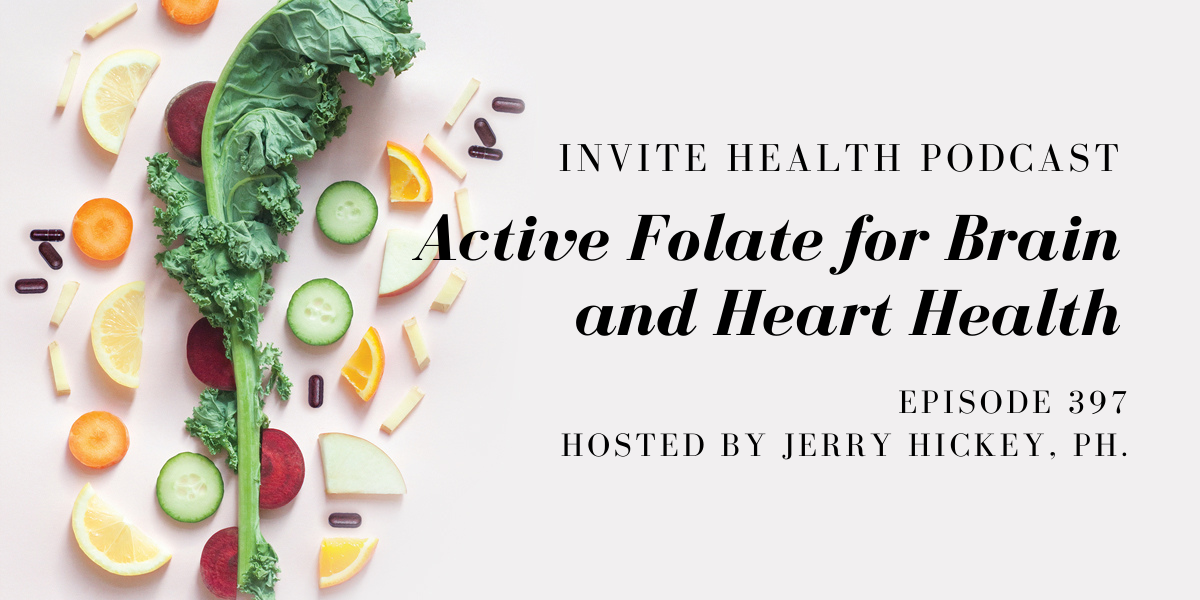Active Folate for Brain and Heart Health – InVite Health Podcast, Episode 397

folate
InViteⓇ Health Podcast, Episode hosted by Jerry Hickey, Ph.
Subscribe Today!
Folate is a B-vitamin. It’s a water-soluble vitamin. It’s sometimes referred to as Vitamin B9. It’s really important to have sufficient folate, but not everybody does, sometimes because of eating habits, genetic issues or age.†
How folate functions in the body
The active form of folate is called methyltetrahydrofolate. It’s needed to make normal, healthy cells. Folate is ubiquitous in vegetables and green leafy things, so it’s named after foliage.†
Without folate, you could develop very large red blood cells, also known as megaloblastic anemia. This can prevent the red blood cells from getting into the blood vessels, which also means oxygen is not flowing through your body as well. That leads to shortness of breath, fatigue and weakness.†
Your folate status is really influenced by genetic variations in the metabolism of the nutrient. There’s an enzyme called MTHFR and about 50% of people have a problem with it. This makes it harder for them to take synthetic folate often found in low quality supplements or the folate in vegetables and convert it into the active form. You can make up for that, to a degree, by taking a powerful folate or folic acid supplement or by eating more vegetables.†
HOW SPECIFIC GENES IMPACT YOUR MOOD & HEALTH – INVITE HEALTH PODCAST, EPISODE 202. Listen Now>>
The role this plays in the brain and heart
If you lack folate, you get an elevated level of homocysteine. Homocysteine is a byproduct of protein metabolism and the body can handle homocysteine when it’s at a level of 12 or less. Once it gets over 12, it becomes toxic. Methyltetrahydrofolate is the vitamin that lowers homocysteine. If your homocysteine is elevated, you have a higher risk of developing heart disease or suffering from a stroke. You also have a higher risk of developing cancer, Alzheimer’s disease or a hip fracture.†
If you’re low in folate long term, you can develop heart disease. A review of 80 human clinical trials showed that even moderately elevated levels of homocysteine in your blood increases your risk of developing cardiovascular disease. This can also lead to clogged blood vessels and coronary heart disease. It makes it hard for blood to flow because the blood vessels are squeezing, so your blood pressure can also go up. Having a little bit of methyltetrahydrofolate can help support normal homocysteine levels in the body.†
This nutrient also plays a role in brain health. Your risk of Alzheimer’s disease may increase if you lack folate. We know that folate is important for brain development in babies, but studies are now showing that it is important for the brain throughout your entire lifespan, especially when you’re elderly.†
In this episode, Jerry Hickey, Ph. discusses the important role the active form of folate plays within the body. He explains the relationship between this nutrient and homocysteine and discusses how these substances both impact the health of your body.†
Key Topics:
- Studies on genetics and Vitamin B9
- Factors that can block the absorption of folate
- What is homocysteine?
Thank you for tuning in to the InViteⓇ Health Podcast. You can find all of our episodes for free wherever you listen to podcasts or by visiting www.invitehealth.com/podcast. Make sure you subscribe and leave us a review! Follow us on Facebook, Twitter and Instagram at InViteⓇ Health today. We’ll see you next time on another episode of the InViteⓇ Health Podcast.


